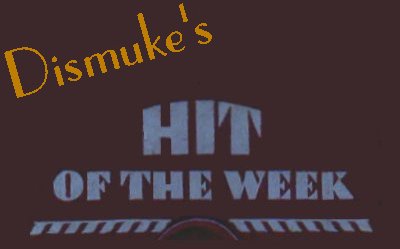

November 2001
November 29, 2001
This week's Hit of the Week is brought
to you by:
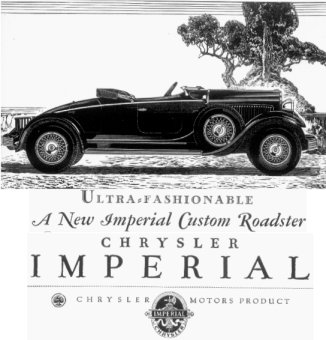
CONNOISSEURS of motor car beauty
have accepted the new Chrysler Imperial as the most beautiful roadster
on the road. It is self-evidently today's masterpiece of style and
symmetry --a sports car different from all traditional designs. The
new custom body is the finest expression of the sophisticated taste and
masterly technique of Locke, who designed it. The sloping silhouette
and the curve of the bas-relief modeling which sweeps with graceful flourish
across the lower section of the body are new notes in roadster appearance--focal
points of charm and distinction. The rumble seat compartment has
a door on the curb side and non-shatterable glass. Besides this alluring
newness of custom-body treatment, the new Imperial Roadster possesses that
smooth, animated, sparkling performance which instantly typifies the masterful
genius of Chrysler engineering. Price $2895 at the factory. Wire
wheels extra.
|
(From 1929 ad)
You've Made
Me Happy Today 
Joe Ryan and His Orchestra
Harold Lang, vocal
1929
(Perfect 15242-B)
One of the many things I love
about the popular music of the late 1920s and early 1930s is the distinctive
closing passages, known as the coda, featured on many recordings.
Not only did the coda provide a definite sense of finality, it often had
a certain grandeur that was typical of so much about the era's cultural
style. This week's selection provides an excellent example.
The recording starts out fairly mundane but, as it progresses, it becomes
increasingly snappy and builds up to a unique and, to me, unforgettable
finale. This record has been in my collection for about a dozen years
now and is one that I dig out and play fairly often.
I am pretty sure that "Harold Lang"
is a pseudonym for vocalist Scrappy Lambert.
Below is a picture of the record's
label. Perfect started out as a subsidiary label of American Pathe
and continued to exist into the mid 1930s under the American Record Corporation.
I have always thought that Perfect had one of the prettiest 78 rpm era
labels. During the early 1930s, the worshipping ladies were "modernized"
with bobbed hair.
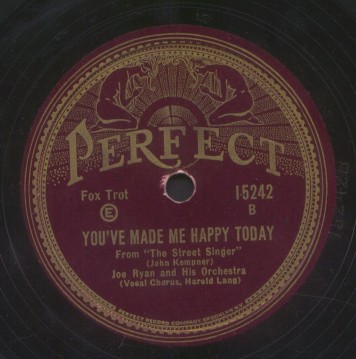
November 22, 2001
This week's Hit of the Week is brought
to you by:
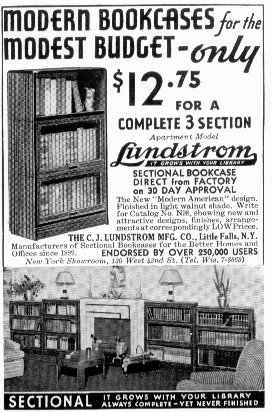
The Lundstrom Sectional Bookcase
(From 1938 ad)
Cotton
Picker's Congregation 
Ambrose And His Orchestra
1937
(Decca 1526-B mx TB-3138-1)
I picked up this unusual swing
recording a few months ago in the dollar bin of a second hand bookstore
and fell for it the moment I played it. The Ambrose band was one
of Great Britain's best and most popular dance bands during the 1930s.
November 15, 2001
This week's Hit of the Week is brought
to you by:

ALAMO PLAZA HOTEL COURTS
(From circa 1930s postcard)
Red Wing 
The Merry Macs
1940
(Decca 3390-A mx DLA-2065)
Shoot The Sherbert
To Me Herbert 
The Merry Macs
1939
(Decca 2842-B mx 66496)
While the Merry Macs were one of
the most popular vocal teams of the early 1940s, the group got its start
in the mid 1920s when three high school age brothers Judd, Joe and Ted
McMichael began performing in Minneapolis under the name "The McMichaels."
In 1927 they were hired by bandleader Joe Haymes who changed their name
to "The Personality Boys." They became known as the Merry Macs with
the addition of vocalist Cheri McKay in 1930. McKay was replaced
by Helen Carroll in 1938. Some of the group's best known recordings
include "Mairzy Doats," "Praise The Lord and Pass The Ammunition" and "The
Hut Sut Song." Ted McMichael passed away earlier this
year at the age of 92.
I have always thought that the Merry
Macs had a style that was very appropriate for the era. Listening
to them conjures up images in my mind of streamlined trains and sleek art
deco buildings.
The song "Red Wing" dates back to
1907 and has been performed in a number of musical genres over the years.
Bob Wills recorded a western swing version and rockabilly star Sammy Masters
had a successful 1959 recording of it under the name "Rockin' Red Wing."
"Shoot The Sherbert To Me Herbert"
is a rather odd song - but this is a fun selection nevertheless.
I especially enjoy the "boogie woogie" style piano solo and the vocal effects
in the second half of the recording.
November 8, 2001
This week's Hit of the Week is brought
to you by:
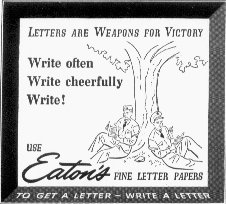
(1942 ad)
November 11 is Veterans' Day or Armistice
Day as it is still called in many countries. I thought it would
be interesting and appropriate to feature a few recordings from World Wars
I and II.
What 'll We Do
With Him, Boys? 
George L. Thompson, vocal
1918
(Emerson 7366 mx 21032)
This song speculates about the fate
of the German Kaiser once he is captured by a bunch of gung-ho doughboys
who are about to set sail for World War I.
G. I. Blues 
Floyd Tillman and His Favorite
Playboys 1944
(Decca 6104-A mx 72005)
This recording provides contrast
to the previous selection's optimism. In it Tillman wonders
how his fellow fun loving, fat and lazy Americans are going to be able
to win the war. This was a big hit for Tillman who was also
the song's composer. Incidentally, this selection has the distinction
of being the newest record featured to date on my site.
The Army Air Corps
March 
Alvino Rey and His Orchestra
The King Sisters and Bill Schallen,
vocal 1942
(Bluebird B-11476-A)
Most people will probably recognize
this tune which is the official song of the United States Air Force.
But back in World War II, the Air Force was called the Army Air Corps.
The King Sisters' vocal gives this selection a nice 1940s feel.
American Patrol 
Glenn Miller and His Orchestra
1942
(His Master's Voice BD 5942
mx 072230)
I have always been fond of this
World War II classic. This sound file will have a somewhat
lower volume than the other selections. The recording has both very
loud and very soft passages - and, for whatever reason, it gave me some
difficulty when I encoded it into Real Audio.
November 1, 2001
This week's Hit of the Week is brought
to you by:
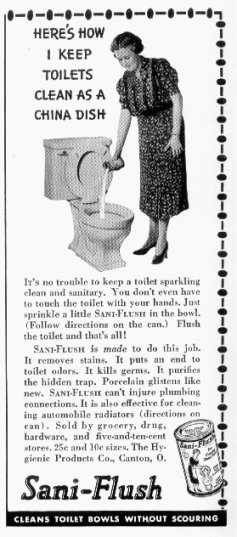
(Sani-Flush - from 1938 ad)
You 
Chick Bullock and His Levee Loungers
1936
(Melotone 06-06-01 mx 18872)
Tain't No Use 
Chick Bullock and His Levee Loungers
1936
(Melotone 06-06-01 mx 18874)
As the in-house vocalist for the
American Record Corporation (ARC), Chick Bullock (1908 - 1981) had
one of the most well-known singing voices in America during the 1930s.
Today he is all but forgotten.
The onset of the Great Depression
, combined with the increasing popularity of radio, was devastating for
the American record industry. For example, in 1928 the Victor Talking
Machine Company sold 37.7 million records. By 1932 annual Victor
sales had dropped over 90% to a mere 3.1 million. People
were reluctant to spend their precious pennies on records when they could
hear the popular tunes of the day over the airwaves for free.
Victor - under the ownership of
the powerful Radio Corporation of America since 1929 - managed to survive
the Great Depression. Virtually all of the other 1920s record labels,
however, either ceased to exist or were absorbed by ARC.
ARC was formed in 1929 when the
Plaza Music Company merged with Cameo Records. Cameo itself
had only recently merged with American Pathe. In 1932 ARC acquired
Brunswick Records which became the company's flagship label. The
once mighty Columbia label was acquired in 1934 for a mere $70,500.
All of the record companies ARC
acquired had a number of subsidiary labels - most of which were phased
out. After the Romeo, Perfect, Banner and Oriole labels were eliminated
in 1935, ARC's main labels were Brunswick, Vocalion and Melotone.
In 1938, ARC was acquired by the Columbia Broadcasting System and
Columbia became the new flagship product.
Bullock's show business career was
limited to records and radio by a disfiguring ailment that caused the white
of one of his eyes to turn black. His "Levee Loungers" were,
in reality, the ARC studio orchestra. The staff changed from session
to session, but often included some of the era's top jazz talent.
Bullock retired in the early
1940s to pursue a career in real estate.

|







